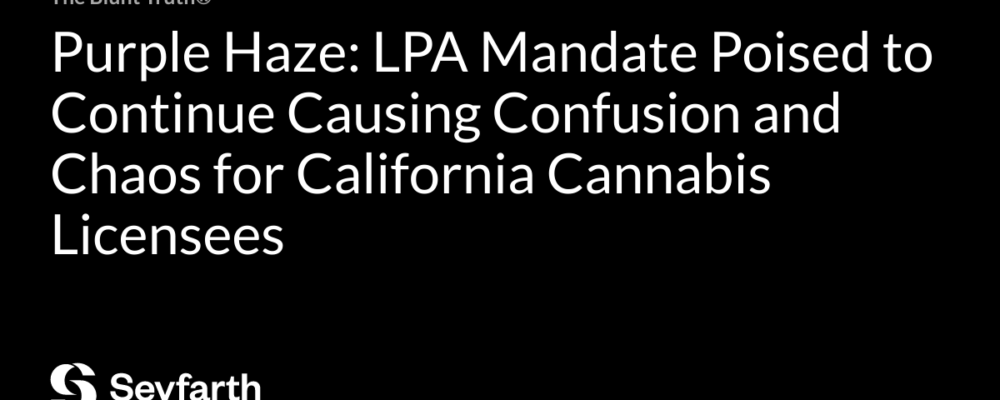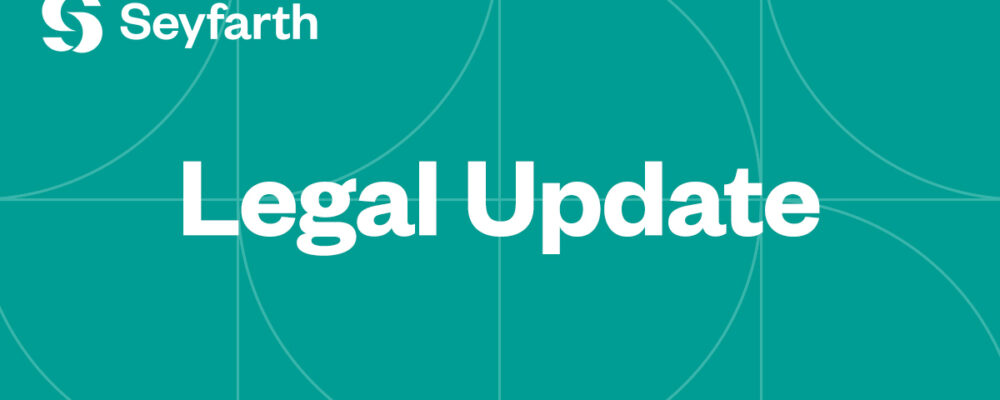By Romtin Parvaresh and Daniel C. Whang
Seyfarth Synopsis: In line with recent anti-arbitration trends, the California Court of Appeal recently decided two cases – Doe v. Second Street Corp. and Liu v. Miniso Depot CA, Inc. – that apply the federal Ending Forced Arbitration of Sexual Assault and Sexual Harassment Act to limit the enforceability of arbitration agreements in cases alleging sexual assault and sexual harassment.
Second Street Corp. holds that the federal Ending Forced Arbitration of Sexual Assault and Sexual Harassment Act (“EFAA”) gives plaintiffs the option to invalidate an arbitration agreement so long as they allege at least one act of sexual assault or sexual harassment occurring after March 3, 2022.
More importantly, Second Street Corp. also holds that when plaintiffs assert both harassment and non-harassment claims, they can invalidate the arbitration agreement with respect to the entire case, not just the harassment claims. The Court of Appeal doubled down several days later by affirming this holding in Liu v. Miniso Depot CA, Inc.on October 7, 2024.
Legislative Background: Congress Adopted The EFAA In 2022 To Limit The Enforcement Of Arbitration Agreements In Cases Alleging Sexual Assault Or Sexual Harassment
The Federal Arbitration Act (“FAA”) generally requires courts to enforce arbitration agreements. Courts have historically interpreted the FAA to articulate a pro-arbitration policy, so that any doubts regarding the enforceability of an arbitration agreement should be resolved in favor of arbitration.
Although arbitration often offers a quick and economical way to resolve disputes, arbitration agreements became a target for reform in the #MeToo movement because unlike a trial before a jury in a public courtroom, arbitration is a private legal proceeding before a single fact-finder. Activists argued that the private forum of arbitration proceedings chilled the voices of sexual assault victims and shielded perpetrators from public scrutiny.
The reform effort was successful. In 2022, Congress amended the FAA by passing the EFAA, codified at 9 U.S.C. §§ 401–402. Under the EFAA, arbitration agreements are unenforceable at the plaintiff’s election in cases involving “sexual harassment” or “sexual assault” that arise or accrue on or after March 3, 2022, the EFAA’s effective date. 9 U.S.C. § 402(a). The terms “sexual harassment” and “sexual assault” are defined in accordance with applicable federal, tribal, or state law. See 9 U.S.C. § 401(3)-(4).
Plaintiff In Second Street Corp. Alleges Sexual Harassment That Occurred Before And After The EFAA’s Effective Date Of March 3, 2022
In Second Street Corp., plaintiff Jane Doe filed a lawsuit in 2023 against her former employer and two supervisors in Los Angeles Superior Court. Relevant here, plaintiff alleged a pattern of sexual harassment and discrimination both before and after the EFAA’s effective date of March 3, 2022, including constructive discharge in May 2022. In addition to claims for sexual harassment and discrimination, plaintiff asserted non-harassment/discrimination claims for wage-and-hour violations. Plaintiff’s claims were brought on an individual basis only.
The Trial Court Held That The EFAA Exempted Plaintiff’s Entire Case From Arbitration
At the trial court, the employer in Second Street Corp. moved to compel arbitration of the entire lawsuit, citing an arbitration provision in its employee handbook. Plaintiff argued that the EFAA rendered the arbitration provision unenforceable because her sexual harassment claim accrued upon her discharge in May 2022, which was after the EFAA’s effective date of March 3, 2022.
The trial court agreed with plaintiff and denied the motion to compel arbitration. The trial court also concluded that EFAA rendered the arbitration provision unenforceable as to the plaintiff’s wage-and-hour claims, even though they did not allege sexual harassment. The trial court explained that the EFAA makes an arbitration agreement unenforceable with respect to a “case,” not merely “‘the claim or claims in which [the sexual harassment] dispute plays a part.’”
The California Court Of Appeal Held That The EFAA Applies To Claims Alleging Sexual Assault Or Sexual Harassment That Occurred Before And After March 3, 2022, So Long As The Last Act Occurred After That Date
On appeal, the Second District of the California Court of Appeal affirmed the trial court’s denial of the motion to compel arbitration in Second Street Corp. The Court held that the EFAA applies to continuing violations that occur, at least in part, after the statute’s effective date, “even if some of the conduct constituting the continuing violation occurred earlier.”
The employer argued that the EFAA does not apply if the sexual harassment claim “accrued, or the ‘crux’ of the alleged wrongful conduct occurred, before the EFAA’s effective date” of March 3, 2022. In rejecting this argument, the Court cited many federal cases that held that “where a plaintiff alleges sexual harassment both before and after the EFAA’s adoption, the action accrues on the date of the last alleged act.” These cases so held in part because “when Congress passed the EFAA in 2022, there was a well-developed body of case law addressing when hostile environment sexual harassment claims ‘accrue.’” Under that well-settled case law, “a sexual harassment claim asserting a continuing violation ‘accrues’ on the date of the last act constituting such violation, even if the conduct could have been actionable earlier.”
As a result, the EFAA applied to plaintiff’s sexual harassment claims because she alleged that the conduct occurred before and after the EFAA’s effective date of March 3, 2022 – starting as earlier as May 2021 and ending in May 2022.
The California Court Of Appeal Held That The EFAA Applies To The Entire Case So Long As One Of The Claims Alleges Sexual Assault Or Sexual Harassment
The Court of Appeal in Second Street Corp. also affirmed the trial court’s conclusion that all of plaintiff’s claims – in other words, the entire case – is exempt from mandatory arbitration under the EFAA.
The employer argued that even if the EFAA applies to the sexual harassment claims, it does not apply to non-harassment claims (i.e., the wage-and-hour claims) which should be ordered to arbitration. The Court rejected this argument, holding that the EFAA applies to the “a case which … relates to the sexual assault dispute or the sexual harassment dispute.” 9 U.S.C. § 402(a) (emphasis added). In so doing, the Court adopted the reasoning in Johnson v. Everyrealm, Inc., 657 F.Supp.3d 535 (S.D.N.Y. 2023). The Johnson court noted that, by its plan terms, the EFAA applied to “a case,” which has long been understood to refer to “an entire action” and not the different “causes of action within it.” Applying this principle, the Court concluded that the EFAA applied to plaintiff’s entire case, even though some claims do not allege harassment, “because all of the causes of action are asserted by the same plaintiff, against the same defendants, and arise out of plaintiff’s employment by the hotel.”
This holding was soon affirmed by a different panel of judges in the Second District. On October 7, 2024, Division One held in Liu that it “agree[d] with our colleagues in Division Three of this appellate district, who recently concluded in [] Second Street Corp. [citation], that the plain language of the EFAA exempts a plaintiff’s entire case from arbitration where the plaintiff asserts at least one sexual harassment claim subject to the act.”
In Liu, the plaintiff asserted both sexual harassment and non-harassment claims. The employer argued that the non-harassment claims should have been ordered to arbitration pursuant to an arbitration agreement, even if the sexual harassment claims are exempt under the EFAA. Rejecting such severance, the Court of Appeal cited Second Street Corp. to hold that “[u]nder the EFAA, when a plaintiff’s lawsuit contains at least one claim that fits within the scope of the act, the arbitration agreement is unenforceable as to all claims asserted in the lawsuit.”
Broader Impact Of Second Street Corp. And Liu
Second Street Corp. and Liu undeniably make it harder for employers to enforce arbitration agreements. In the past, plaintiffs sometimes brought harassment and non-harassment claims in two different lawsuits to streamline discovery and litigation. Now, however, they are incentivized to combine harassment and non-harassment claims into a single lawsuit, in order to avoid arbitration of all claims altogether.
The risk of this “all-or-nothing” approach is particularly pronounced in the context of wage-and-hour class actions. In order to avoid the burden of class action litigation, many employers rely on arbitration agreements with class action waivers to compel wage-and-hour claims to arbitration on an individual basis only. Some may now argue that this well-established practice is rendered invalid whenever a harassment claim is alleged in a class action lawsuit. Fortunately, neither Second Street Corp. nor Liu support such an expansive reading.
Both cases distinguished Mera v. SA Hospitality Group, LLC 675 F. Supp. 3d 442 (S.D.N.Y. 2023), which compelled wage-and-hour claims to arbitration by severing them from harassment claims, on grounds that the harassment claims were brought on an individual basis but the wage-and-hour claims were brought on a representative basis. By contrast, the non-harassment claims in Second Street Corp. and Liu were brought on an individual basis only. As a result, both cases expressed no opinion on what impact the EFAA would have on class or representative claims, because no such claims were present. It is likely that this issue will be heavily litigated in trial courts across the state until California appellate courts weigh in.
Employers may also explore creative strategies to avoid the EFAA altogether. The arbitration agreements in Second Street Corp. and Liu triggered the EFAA because they covered claims for sexual harassment and sexual assault. To avoid this issue, employers may now try to revise arbitration agreements to expressly exclude claims for sexual harassment and sexual assault. Whether this practice will prove effective is yet to be determined.
“With approximately 900 lawyers across 17 offices, Seyfarth Shaw LLP provides advisory, litigation, and transactional legal services to clients worldwide.”
Please visit the firm link to site






